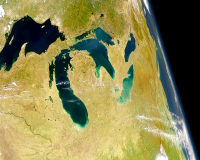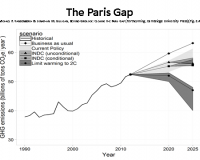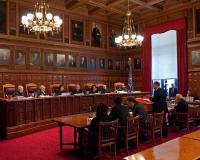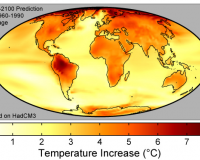
Vibrant Environment
Climate Change And Sustainability
All | Biodiversity | Climate Change and Sustainability | Environmental Justice | Governance and Rule of Law | Land Use and Natural Resources | Oceans and Coasts | Pollution Control

There is an alarming new study out, funded by NASA and the National Science Foundation. It was published in Geophysical Research Letters and announced at the American Geophysical Union fall meeting. Together, these are the heavyweights in climate change research and analysis. Their findings: The world’s lakes are warming at an alarming rate, much faster than the oceans or the atmosphere. The study monitored 235 lakes, spanning six continents and representing half the world’s freshwater supply, for 25 years.

Strategies for cities and states to reduce food waste can be thought of through the lens of the “Three Rs” of EPA’s Food Recovery Hierarchy—reduction, reuse, and recycling. In food waste terms, the Three Rs mean preventing wasted food at the source, donating wasted food leftovers, and recycling food waste through composting or anaerobic digestion.
The recent ReFED report on reducing food waste quantifies the economic value and diversion potential of different strategies related to each of the Three Rs. According to ReFED, source reduction and donation generate the most economic value per ton of food saved, while food recycling and composting have the potential to divert a much greater quantity of food from landfills.

Early in the fall of 2016, there was growing cause to celebrate the international momentum building around climate mitigation. In October, United Nations actors reached agreements to limit airline emissions and later HFCs. On November 4, the Paris Agreement under the U.N. Framework Convention on Climate Change went into effect. Then, four days later, Donald J. Trump was elected president, casting doubt on the U.S. climate commitments made by President Obama’s Administration. Though his Tweets and stump speeches may not equate directly to his eventual climate policy, the surprise election results have certainly caused consternation among advocates of climate mitigation and adaptation.

In the February issue of ELR’s News & Analysis, ELI President Scott Fulton and Visiting Attorney Dr. Maria L. Banda highlight the role that national judiciaries worldwide have played in developing the field of “climate law.” In Litigating Climate Change in National Courts: Recent Trends and Developments in Global Climate Law, Fulton and Banda examine the procedural tools and interpretive principles that judges have used to decide novel legal issues in climate litigation, focusing on some of the key lawsuits from civil and common-law jurisdictions that may influence climate law beyond their borders.

The Paris Agreement on climate change is a world-shattering event, a rare coming together of the international community to face a shared threat. Former President Obama deserves a lot of credit for the success of the two-week conclave, because of his earlier diplomacy with China and executive actions to reduce emissions, and Secretary of State John Kerry also deserves kudos for staying on site in Paris to see the agreement to its conclusion. Praise also belongs to the conference organizers, staff, and leaders, not to mention the hundreds of delegates.

On November 10, 2016—just two days after Election Day—there was another surprising turn of events: a federal district court judge in Oregon handed a long-shot victory to a group of young activists suing the federal government over its history of action and inaction regarding fossil fuels and climate change. Denying the defendants’ motions to dismiss in a thorough and groundbreaking opinion, Judge Ann Aiken found there was a sufficient legal basis for the plaintiffs to pursue their constitutional and common-law claims for the case to proceed to the next litigation stage. Now, in the waning days of the Obama Administration, the case is entering uncharted territory. On top of the unprecedented nature of the case itself, the uncertainty regarding the presidential transition extends to the course this case may take and to its importance going forward.

After the revelation that July and August tied as the warmest months ever recorded in human times, the discovery of a potentially habitable planet circling a red dwarf star that is part of the nearby Alpha Centauri system was welcome news. Proxima Centauri b is the closest Earth-like planet beyond the solar system, 4.3 light years away. By the year 2500, when a new study predicts almost 50 feet of sea-level rise — which would wipe out the homes of billions, erasing whole nations from the globe — we should have the star drive needed to migrate to a new planet.

The sage lexicographers at the Oxford Dictionary chose the hyphenated couplet post-truth as the Word of the Year for 2016 — twelve months that saw made-up facts supersede real facts on a daily basis. An analysis by BuzzFeed concluded that “in the final three months of the U.S. presidential campaign, the top-performing fake election news stories on Facebook generated more engagement than the top stories from major news outlets” including the New York Times, Washington Post, and 17 others — combined.

In 2015, the U.S. Department of Agriculture and Environmental Protection Agency announced an ambitious goal of reducing food waste in the United States by 50% by 2030. While the change in presidential administrations presents new obstacles for many federal environmental initiatives, reducing food waste continues to offer fertile ground for cooperation.

President-elect Donald Trump's environmental agenda to date has generally been focused on undoing certain specific Obama administration regulations, such as the Clean Power Plan (CPP) or the Waters of the United States (WOTUS) rule, and relaxing restrictions on domestic fossil fuel exploration and production.